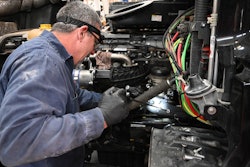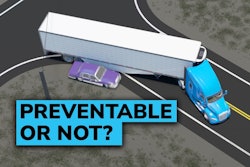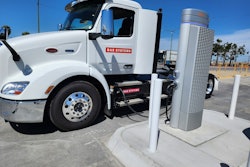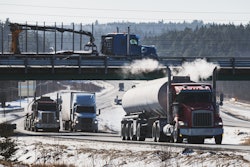Western States Trucking Association Director of Governmental Affairs Joe Rajkovacz had a message for any owner-operator or small fleet across the country who anticipated even the slightest possibility of delivering to a port or rail-intermodal facility in California at some point within the next few years.
"It doesn't matter if you're hauling out of the meat patch in the Midwest," he said, if your deliveries might take you to such a facility, "you need to register" your trucks with the California Air Resources Board. "If the truck's not in there, you can't go into a port in California with an export load."
That's due to the reality of CARB's Advanced Clean Fleets regulation for in-use port-serving equipment. As it currently stands, the ACF requires any truck not added to the CARB TRUCRS registry for equipment by the end of the year to be a "zero-emissions vehicle" (ZEV) to register to serve the ports thereafter, as previously reported. (For guidance on registering, visit this link.)
What registering will do, fundamentally, is buy an owner-operator or fleet time to get the use out of their current diesel equipment without penalties, Rajkovacz said, for its minimum useful life, or 18 years.

[Related: With CARB ZEV deadline looming, port dray haulers turn to battery electric trucks]
Small fleet owner Bill Barhite, winner in the 3-10 truck division of Overdrive's Small Fleet Championship, noted he had his work cut out for him before the end of the year, given he and the owner-operators leased on with his Butterfly Xpress 10-truck fleet deliver to California "all the time."
And it's not just registration in the TRUCRS system for potential future port work with his diesels that he'll be working on.
Rajkovacz was speaking as part of the National Association of Small Trucking Companies' annual conference in Nashville, Tennessee, this past Friday, and spent a sizable part of his presentation on California's likewise new Clean Truck Check program. It puts in place an emissions-testing program for trucks registered in California, as well as those operating within the state but registered elsewhere. As Overdrive has recently reported, a new registry for that program was established and is open now via this link, with an end-of-year deadline for adding trucks to the database.
For vehicles 2013 model year and newer, "you get the privilege of paying a $30 per truck fee," Rajkovacz said, and "you’ll have to test the truck [with] an electronic download from the truck’s ECM and upload it to CARB" at least once next year. Over time, the frequency of required testing grows to twice a year, then four times a year. For CARB-compliant vehicles older than 2013, the $30/truck fee also applies, yet a different testing method, the previously-used "smoke opacity test, is required," Rajkovacz added. "You'll need an SAE J1667 compatible smoke meter" for the test and results have "to be uploaded to CARB" on the same frequency.
"It ain’t gonna be cheap, folks," he said. Old exemptions for one-truck owner-operators from performing similar tests are gone under the new regulation.
Outside vendors and shops can also perform the tests, and Rajkovacz expects a growing market heading into next year. He pointed to a WSTA affiliate member in Cleanfleets.net that works with fleets of 10 trucks or more, "just for the registration side of things," he said. "As an association," too, "we’ve always helped smaller members with this registration. ... That’s one of the problems with this -- it will be costly, with time away from productive activities." To do the testing four times a year in the future "will be a big time suck."
Don't register the truck and perform the checks? "You can get cited," Rajkovacz emphasized. "CARB inspection agents don’t have primary police authority in California. You will always see them with [the California Highway Patrol]. It’s a shotgun marriage. CHP officers don’t like this – it's something not related directly to highway safety." Yet "they have been migrating to California's ports of entry for enforcement," even installing in some instances "overhead systems that can sniff your exhaust."
For small fleets and owner-operators, to perform the tests in-house, a tech/owner needs to be certified through a "six-module course online" through CARB, Rajkovacz said, "then buy a smoke opacity tester and get a CARB-validated OBD test device" for the newer vehicles. He said those run "about $600 or so."
As far as the future of the program itself, Rajkovacz pointed to the success of past litigation against states over passenger-vehicle emissions testing and required fees, likewise the Owner-Operator Independent Drivers Association's suit against New York's truck-decal fees, deemed unconstitutional and a burden on interstate commerce in 2016.
He suspects similar arguments could prevail in court around the CARB "Clean Truck Check" program. "This is the first time ever CARB’s decided, 'we’ll make these truckers pay for this,'" he said of the registration fees. While he's "heard there’s a group who wants to sue over the fee collections," they may want to "wait till there’s a pile of money there." There's as yet been "no suit testing the 'smog check,' yet."
Arguments get started in D.C. appeals court over 'Advanced Clean Trucks'
CARB's overlapping Advanced Clean Fleets and Advanced Clean Trucks rules, however, are in the sights of several cases. The latter is being challenged in the Washington, D.C., federal appeals court by a bevy of parties after Rajkovacz's WSTA filed suit in WSTA v. EPA over what's viewed by petitioners as an invalid waiver issued by EPA to California to enforce the rule, enabling other states to adopt it.
Initial arguments were filed to the appeals court by the plaintiffs last week, arguing that by granting the waiver, "EPA purported to authorize California to go much further, by doing what EPA cannot do itself: mandate the electrification of large trucks, from Ford F-250 pickups to tractor-trailers, in an effort to address the risks of global climate change. But whether EPA mandates electric vehicles unilaterally or does so jointly with California, forcing electrification raises a 'major question' and thus requires 'clear congressional authorization.'"
Rajkovacz said he's hopeful the argument prevails, in time. Given the large number of parties who've joined the case on both sides, he noted that if the argument doesn't prevail in the appeals court, "it will go to the Supreme Court, but will the Supreme Court hear it?"
Petitioners in the case argue that another case decided last December, West Virginia v. EPA, demonstrates the need for "clear congressional authority" for this particular waiver. That December case went in favor of West Virginia against EPA's Clean Power Plan, with a ruling that such congressional authority was needed prior to EPA's action given demands the Clean Power Plan would place on existing power plants fell within the "major questions" doctrine.
[Related: CARB facing more lawsuits over latest emissions regs]
WSTA's also got litigation in California state courts against the Advanced Clean Fleets portion of CARB's rule, which hasn't been granted such an EPA waiver as yet. WSTA's arguing CARB didn't "follow proper process and procedure," Rajkovacz said, in promulgating the rule. Thus, WSTA argues, the state's own environmental laws were violated.
Notably, the California Trucking Association, meanwhile, is challenging the ACF on a variety of grounds, including interference with interstate commerce given impact on operations domiciled far beyond California's borders. Rajkovacz has less near-term hope for that one, given the Ninth Circuit Court of Appeals' jurisdiction out West where it will initially be heard. At once, he notes it's "unique" in that it's "the first time I've seen a commerce-clause argument used to attack environmental regs."
Download WSTA v. EPA petitioners' initial arguments filed last week via this link.











